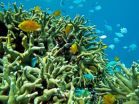(Press-News.org) WASHINGTON, D.C. -- A new illustration of the seafloor, created by two of the world's leading ocean floor mapping experts that details underwater terrain where the missing Malaysia Airlines flight might be located, could shed additional light on what type of underwater vehicles might be used to find the missing airplane and where any debris from the crash might lie.
The seafloor topography map illustrates jagged plateaus, ridges and other underwater features of a large area underneath the Indian Ocean where search efforts have focused since contact with Malaysia Airlines flight MH370 was lost on March 8. The image was published today in Eos, the weekly newspaper of the Earth and space sciences, published by the American Geophysical Union.
The new illustration of a 2,000 kilometer by 1,400 kilometer (1,243 miles by 870 miles) area where the plane might be shows locations on the seafloor corresponding to where acoustic signals from the airplane's black boxes were reportedly detected at the surface by two vessels in the area. It also shows the two plateaus near where these "pings" were heard.
It points out the deepest point in the area: 7,883 meters (about five miles) underneath the sea in the Wallaby-Zenith Fracture Zone – about as deep as 20 Empire State buildings stacked top to bottom. Undersea mountains and plateaus rise nearly 5,000 meters (about three miles) above the deep seafloor, according to the map.
The illustration, designated as Figure 1 of the Eos article, was created by Walter H.F. Smith and Karen M. Marks, both of the National Oceanic and Atmospheric Administration's Laboratory for Satellite Altimetry in College Park, Maryland, and the former and current chairs, respectively, of the Technical Sub-Committee on Ocean Mapping of the General Bathymetric Chart of the Oceans, or GEBCO. GEBCO is an international organization that aims to provide the most authoritative publicly available maps of the depths and shapes of the terrain underneath the world's oceans.
Satellite altimetry has made it possible to depict the topography of vast regions of the seafloor that would otherwise have remained unmapped, Smith said. To illustrate the topography of the search area, Smith and Marks used publicly available data from GEBCO and other bathymetric models and data banks, along with information culled from news reports.
Smith said the terrain and depths shown in the map could help searchers choose the appropriate underwater robotic vehicles they might use to look for the missing plane. Knowing the roughness and shape of the ocean floor could also help inform models predicting where floating debris from the airplane might turn up.
Smith cautions that the new illustration is not a roadmap to find the missing airplane. Nor does the map define the official search area for the aircraft, he added.
"It is not 'x marks the spot'," Smith said of their map. "We are painting with a very, very broad brush."
Search efforts for the missing airplane have focused on an area of the southern Indian Ocean west of Australia where officials suspect that the plane crashed after it veered off course. After an initial air and underwater search failed to find any trace of the airplane, authorities announced this month that they will expand the search area and also map the seabed in the area.
Smith pointed out that the search for the missing plane is made more difficult because so little is understood about the seafloor in this part of the Indian Ocean. In the southeast Indian Ocean, only 5 percent of the ocean bottom has been measured by ships with echo soundings. Knowledge of the rest of the area comes from satellite altimetry, which provides relatively low-resolution mapping compared to ship-borne methods.
"It is a very complex part of the world that is very poorly known," Smith said.
A lack of good data about Earth's seafloors not only hinders search efforts, it also makes it harder for scientists to accurately model the world's environment and climate, Smith noted. Today, our knowledge of our planet's undersea topography is "vastly poorer than our knowledge of the topographies of Earth's Moon, Mars and Venus," Smith and Marks write in Eos. This is because these other planetary bodies have no oceans, making their surfaces relatively easy to sense from space.
Smith said he hoped that "the data collected during the search for MH370 will be contributed to public data banks and will be a start of greater efforts to map Earth's ocean floor."
INFORMATION:
The American Geophysical Union is dedicated to advancing the Earth and space sciences for the benefit of humanity through its scholarly publications, conferences, and outreach programs. AGU is a not-for-profit, professional, scientific organization representing more than 62,000 members in 144 countries. Join our conversation on Facebook, Twitter, YouTube, and other social media channels.
AGU: Experts publish new view of zone where Malaysia Airlines flight 370 might lie
2014-05-27
ELSE PRESS RELEASES FROM THIS DATE:
Rules to cut carbon emissions also reduce air pollution harmful to people, environment
2014-05-27
(Syracuse, NY – May 27, 2014) Setting strong standards for climate-changing carbon emissions from power plants would provide an added bonus – reductions in other air pollutants that can make people sick; damage forests, crops, and lakes; and harm fish and wildlife. This, according to a first-of-its-kind study released today by scientists at Syracuse University and Harvard who mapped the potential environmental and human health benefits of power plant carbon standards.
The authors of the new study, Co-benefits of Carbon Standards: Air Pollution Changes under Different ...
Skin grafts from genetically modified pigs may offer alternative for burn treatment
2014-05-27
A specially-bred strain of miniature swine lacking the molecule responsible for the rapid rejection of pig-to-primate organ transplants may provide a new source of skin grafts to treat seriously burned patients. A team of investigators from Massachusetts General Hospital (MGH) report that skin grafts from pigs lacking the Gal sugar molecule were as effective in covering burn-like injuries on the backs of baboons as skin taken from other baboons, a finding that could double the length of time burns can be protected while healing. The report in the journal Transplantation ...
EuroPCR 2014 session defines future horizons for renal denervation
2014-05-27
23 May 2014, Paris, France: During EuroPCR 2014, Felix Mahfoud, University Hospital in Homburg, Germany, and Konstantinos Tsioufis, University of Athens, Greece, reflected on the potential future role of modulation of the sympathetic nervous system in patients with difficult-to-control hypertension.
In the context of the SYMPLICITY-HTN-3 clinical trial results, questions were raised about the extent of the procedure's efficacy although the randomised, controlled trial confirmed the safety of renal denervation.
"In terms of efficacy, some studies have shown that renal ...
New biodiversity study throws out controversial scientific theory
2014-05-27
Researchers have today released ground-breaking findings that dismiss the 'Neutral Theory of Biodiversity'. The theory has dominated biodiversity research for the past decade, and been advocated as a tool for conservation and management efforts.
Professor Sean Connolly from the ARC Centre of Excellence for Coral Reef Studies (Coral CoE) at James Cook University (JCU) is the lead author of the international study, which he says overturns the long-used theory by employing a novel mathematical method. It is the largest study of its kind, covering a broad range of marine ...
Does apolipoprotein E mimetic peptide reduce neuronal apoptosis induced by DBI?
2014-05-27
Because the majority of patients with diffuse brain injury are not suitable candidates for surgery, neuroprotective agents are of great importance. Apolipoprotein E exerts a neuroprotective effect against brain injury, but synthetic apolipoprotein E cannot cross the blood-brain barrier, thus limiting its application.It has been reported that apolipoprotein E (138) mimetic peptide can cross the blood-brain barrier in both normal and injured brain. However, its impact on neurological function following diffuse brain injury is still unclear. Prof. Jianmin Li and team from ...
A novel disease-preventing antioxidant pathway
2014-05-27
Interested in antioxidants? They protect us against aging and cancer. It's one of the reasons we like our green tea and even our broccoli. But there is a new kid on the antioxidant block - uric acid. But wait, you're thinking, doesn't uric acid cause gout? A team in Singapore has recently showed that uric acid is a major intracellular antioxidant, possibly even more important than the antioxidants we try to eat. They also discovered how uric acid helps to prevent aging and disease and how it helps in the treatment of cancer.
Traditionally, uric acid has a bad reputation ...
Immunologists discover immune system precursor cells that fight infection
2014-05-27
The innate immune system recognizes infectious agents such as viruses and bacteria. A group of lymphocytes known as "innate lymphoid cells" or ILCs plays a central role in the defense of the human body against infective agents. Professor Andreas Diefenbach of the Research Center Immunology at the Mainz University Medical Center, working in collaboration with scientists at the University of Freiburg, has discovered previously unidentified ILCs that are able to protect epithelial surfaces, such as those of the intestinal mucosa, against infection. The results provide important ...
Using thoughts to control airplanes
2014-05-27
The pilot is wearing a white cap with myriad attached cables. His gaze is concentrated on the runway ahead of him. All of a sudden the control stick starts to move, as if by magic. The airplane banks and then approaches straight on towards the runway. The position of the plane is corrected time and again until the landing gear gently touches down. During the entire maneuver the pilot touches neither pedals nor controls.
This is not a scene from a science fiction movie, but rather the rendition of a test at the Institute for Flight System Dynamics of the Technische Universität ...
Melatonin makes old bones stronger
2014-05-27
Faleh Tamimi, a professor in McGill's School of Dentistry, is the leader of a research team that has just discovered that melatonin supplements make bones stronger in elderly rats and therefore, potentially, in elderly humans too. "Old rats are tedious to work with because they get sick a lot and that means they also cost a lot more. But if you're interested in diseases like osteoporosis, they're an essential part of the process."
Dem bones, dem bones, dem dry bones – sleep and bone regulation
The process of bone breakdown and buildup is affected by our circadian ...
Intermediaries increase corruption
2014-05-27
This news release is available in Spanish.
In reality, an intermediary participates in many, if not most, cases of corruption. However there has been very scarce empirical evidence that illuminates their role in these situations. This is what a researcher at UC3M has analyzed in collaboration with scientists from Florida State University and Southern Methodist University, in Texas (both in the United States). The results of their study, recently published in Experimental Economics, confirm their suspicions: "Our work showed that the number of persons involved in cases ...


